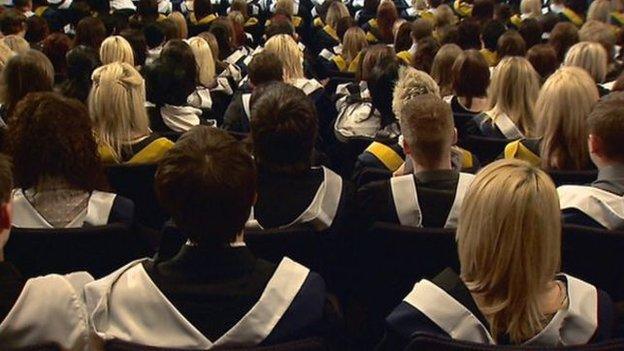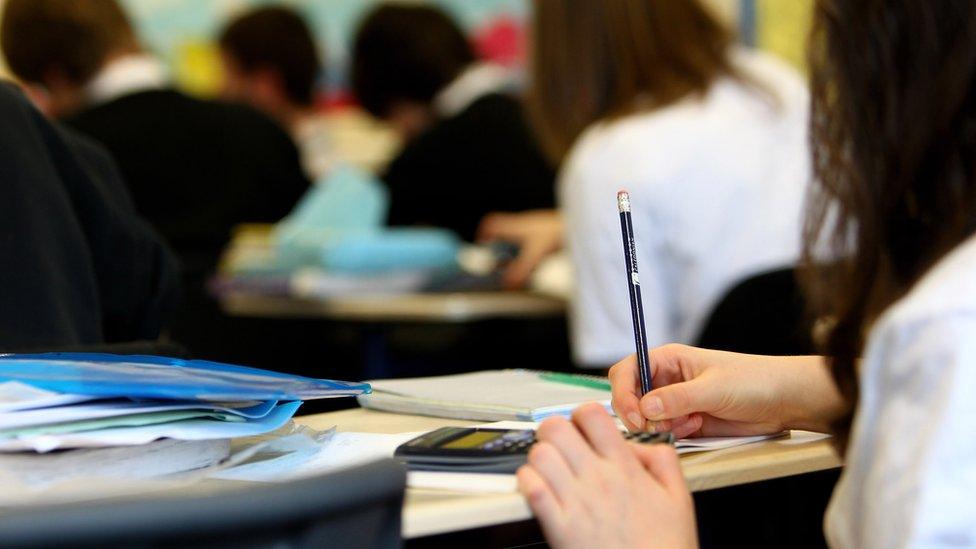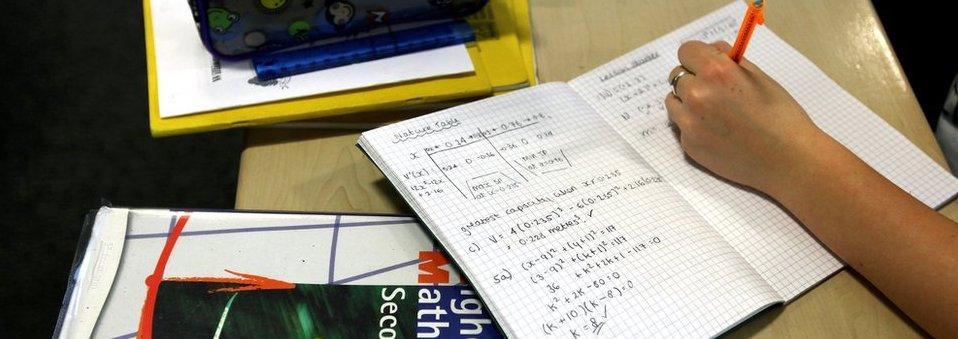Record number of Scots apply to university
- Published

A record number of Scots have applied for university, according to official figures.
More than 45,400 applied before the 15 January deadline.
The statistics also revealed there was an increase in applications from young people living in the most deprived areas.
But the proportionate rise in the numbers from disadvantaged areas in England and Wales this year was far greater.
A total of 45,420 individual applicants living in Scotland applied for a university place before 15 January - a 1% increase on last year and a new record for the January deadline.
The Scottish government said there were similar increases in Wales and Northern Ireland and a drop in England.

Most people apply for places at several universities.
Between them the applicants from Scotland made 177,220 applications to Scottish universities - a rise of 2,340 on last year - and 46,510 applications to institutions in other parts of the UK.
Scottish students at universities in the rest of the UK are charged tuition fees of up to £9,000 a year. Normally the fees are paid by the student awards agency SAAS and the money is repaid once the student has finished university and is earning a certain salary.
The Scottish government noted that application rates for 18 year olds living in the most deprived areas in Scotland also increased to the highest level recorded - it said they were 65% more likely to apply compared to 2006.
The government has said closing the attainment gap and encouraging more young people from disadvantaged areas to go to university is a priority.
According to the admissions service UCAS, young people from the least advantaged areas of the UK are more likely to apply to higher education than ever before.

Analysis by Jamie McIvor, BBC Scotland education correspondent

Free university tuition has been one of the Scottish government's flagship policies.
Sceptics, including some who support the principle of free tuition, have questioned whether the policy actually helps widen access to university - or merely removes a perceived barrier.
Some critics have described the policy as a "middle class benefit" and contrasted the cost of free university tuition with cuts to college budgets in recent years.
Supporters of the Scottish government's policy turn the argument on its head, asking how tuition fees could possibly encourage anyone to apply.
It is widely accepted by people on both sides of the debate that helping more people from deprived and disadvantaged backgrounds get to university is a complex problem which is not simply about money.
Closing the attainment gap begins in nurseries and primary schools, ensuring children do not fall behind their more advantaged peers. Later it means helping more teenagers get good enough qualifications to apply to university.
Some universities also do outreach work at schools in disadvantaged areas, simply trying to "normalise" the idea of going to university among children, teenagers and parents.
Even an academically-able teenager who has no friends or relatives who have been to university may have misconceptions about higher education and whether or not it would be for them.
It's also been argued that UCAS figures do not always reflect the total number of Scots from disadvantaged areas who hope to gain a degree as they don't reflect the work of colleges.
For example, some college courses allow students to go straight into the third year of a university degree after they have obtained an HND.

While the number of applicants from disadvantaged parts of Scotland rose 2% this year, in England the rise was 5% and in Wales 8%. In Northern Ireland the number slipped 4%.
Cabinet Secretary for Education and Lifelong Learning Angela Constance said the statistics demonstrated the "real ambition" of young people in Scotland.
It also underlined Scotland's "global reputation" for excellence in higher education, she added.
"We have five institutions in the world's top 200, more per head of population than any other country except Luxembourg. We are continuing to invest over £1bn in the sector, to ensure it keeps punching above its weight on a global level.
"With the highest percentage increase in applications from non-EU students, Scotland is fast becoming the country of choice on these islands for anyone seeking to study at university. That has wider benefits for our society and economy."
'Budget slashed'
She added that the Commission on Widening Access will report soon on further ways to help more students from disadvantaged backgrounds benefit from a degree education.
Labour's education spokesman Iain Gray said cuts to councils' budgets would make it harder for young people from disadvantaged areas to get to university.
He said: "The reality is that under the SNP government children from richer families are twice as likely to go to university as those from poorer homes, student debt has doubled and grants have been slashed.
"The cut proposed by the SNP budget will only make this worse as local budgets take a hammering and with the education budget set to be slashed by £130m and local education budgets set to be hammered. "